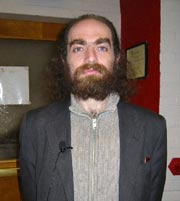

I have to admit that I really appreciate the work of mathematicians. I secretly would like to have a math club to do some hardcore divisions. This story is about a Russian mathematic that is kind of a hermit and won a price for his work, but he prefers only to explain his achievements rather than to celebrate the explaining.
"He looked like Rasputin, with long hair and fingernails," Robert Greene of UCLA told The New York Times. When he spoke at Harvard, Perelman declared he would sacrifice some clarity and linearity for "liveliness," which apparently meant hardly writing down a thing during the entire lecture. (After, one mathematician thanked him for wasting so little chalk.) When the press began showing up at his appearances, Perelman packed it in and went home, though for the next year or two he maintained a correspondence with his peers, answering every question fired at him.Perelman's colleagues eventually ballooned his elegant short story into something more like War and Peace—all told about 1,000 pages have been published thus far to explain Perelman's work on Poincaré, and the ultimate conclusion is that Perelman was right. (The verdict is still out on the geometrization conjecture.)
"[Perelman] is very focused on mathematics," Morgan said. "When the conversation is mathematical, he is quite open and approachable." But when the conversation about math turned to million-dollar prizes and Fields medals, Perelman went AWOL.

